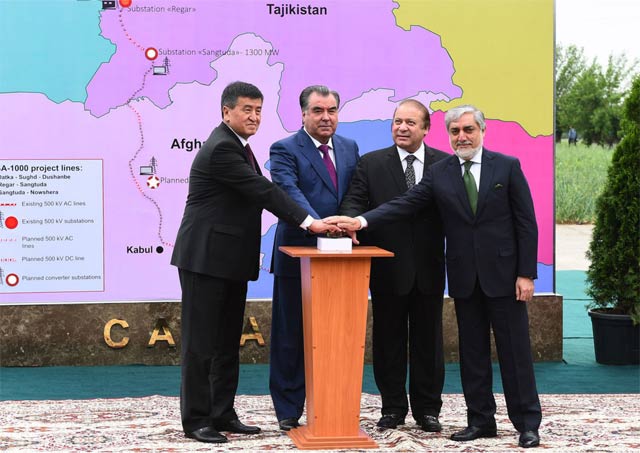
“The three companies that responded to the invitation for fresh bids are Switzerland-based ABB, Germany’s Siemens and Alstom of France, which have expressed interest in setting up two converter stations in Tajikistan and Afghanistan,” an official of the Ministry of Water and Power said.
Pakistan to receive more as Afghanistan abandons share in CASA-1,000
The number of converter stations has been reduced from three to two which will bring down cost of the project.
“Bids of these companies are being evaluated and no decision on the award of contract has been taken so far,” the official said.
Earlier, the joint working group and the Intergovernmental Council of the Casa-1,000 project met in Almaty in April 2016, where they examined the sole bid received for establishing three converter stations. They noted that since the bid was very high and the countries that were part of the project had concerns about technical capability of the bidder, the original plan for three converter stations could be modified.
They agreed to opt for two converter stations and announce a fresh tender in the next two months. The revised plan includes two converter stations with a separate high-voltage direct current (HVDC) back-to-back connection in Afghanistan on an existing 220-kilovolt line between Tajikistan and Afghanistan.

The power ministry official, however, expressed surprise over recent comments of the Planning Commission that called the Casa project expensive at a time when all deals had been signed and the power regulator had given its approval and set a tariff.
CASA-1000: Tajikistan to export 1,000MW hydel electricity
The regulator - National Electric Power Regulatory Authority (Nepra) - has approved the tariff at 9.41 cents per unit for electricity import from the Central Asian states. This includes energy charges at 5.15 cents per kilowatt-hour (kWh), transmission charges at 2.91 cents per kWh, transit fee for Afghanistan at 1.25 cents per kWh and wheeling charges for Tajikistan at 0.10 cent per kWh.
Already, Pakistan is importing 73 megawatts from Iran to meet the requirement of Gwadar at a cost of 6.25 cents per unit, which is higher than 5.15 cents that will be paid to Tajikistan. The difference is because of the fuel as Iran consumes oil and gas for power generation while Tajikistan will supply hydroelectric power.
The total cost of electricity import from Iran amounts to 10.60 cents per unit, according to the record shared with Nepra for May 2016. In Pakistan, gas is a cheaper source of power generation and it costs 5.33 cents per unit, but it is still higher than 5.15 cents for electricity import from Tajikistan.
In Afghanistan, the power generation cost is estimated at around 6 cents per kWh. Russia, Turkmenistan and Azerbaijan have already offered electricity supply to bridge the deficit in Pakistan.
PM Nawaz, Central Asian leaders launch CASA-1000 project in Tajikistan
“The Central Asia South Asia Regional Electricity Market is envisaged to be developed in a phased manner through institutional arrangements and infrastructure building that will utilise Central Asia’s power resources to tackle shortages in South Asia,” the power ministry official said.
the writer is a staff correspondent
Published in The Express Tribune, June 27th, 2016.
Like Business on Facebook, follow @TribuneBiz on Twitter to stay informed and join in the conversation.

1731051730-0/BeFunky-collage-(33)1731051730-0-165x106.webp)


1731049366-0/BeFunky-collage-(31)1731049366-0-165x106.webp)












COMMENTS (3)
Comments are moderated and generally will be posted if they are on-topic and not abusive.
For more information, please see our Comments FAQ